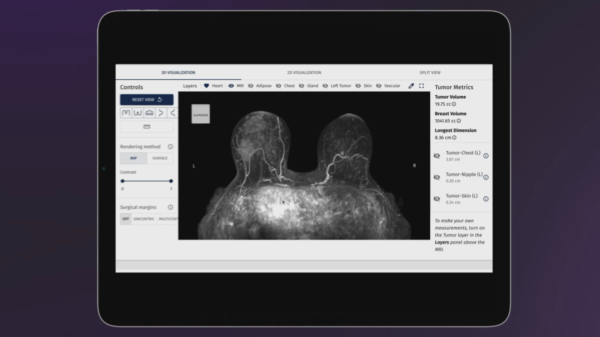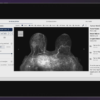A 60-year-old woman in Scotland’s most heavily populated city was just diagnosed with lung cancer after an AI program examined her chest X-ray.
That is, Qure.ai’s qXR artificial intelligence software. The New York-based diagnostics company recently showcased data on its technology at the World Conference on Lung Cancer in California.
It is capable of detecting suspicious nodules in a person’s chest within three years before symptoms manifest.
Glasgow’s Diane McCallum had been plagued with a persistent cough before receiving the X-ray. The software then detected an abnormality and she was referred to a radiologist for a low-dose CT scan. This widely used testing machine confirmed that she had the disease.
“I had my X-ray at about 3.30 pm, and by 9.15 am the following day I’d had a phone call to say something had been found and that I was being referred for CT imaging,” McCallum said. “Having the AI enhancement at the beginning of the process is life saving really, who knows how it might have turned out without it.”
This timely diagnosis, assisted by AI, enabled her to receive surgery within less than two months. The procedure was followed up with chemotherapy treatment.
“It also meant her stage of lung cancer didn’t migrate into a more significant stage that would become more difficult to treat,” Dr John MacLay, a respiratory consultant from the National Health Service, said.
Read more: Breath Diagnostics onboards new president and closes critical financing
Read more: Breath Diagnostics pioneers novel lung cancer breath test
Innovations in early detection improve survival rates drastically
The five-year survival rate for patients with early stage lung cancer is approximately 64 per cent. This number drops exponentially as time passes.
Moreover, only about 18.5 per cent of lung cancers are diagnosed in the early stages, which is of great concern.
Thankfully, new developments with AI and other technologies have brought more timely treatment options with them. qXR may have been the difference between life and death for Diane.
In China, a group of researchers recently pioneered a lung cancer breath test that can diagnose patients at warp speed compared to past options. The American company Breath Diagnostics Inc. has also developed a similar but distinct non-invasive breath analysis technology.
Other testing methods gaining popularity include phlegm/sputum tests, blood biopsies and robotic bronchoscopy tool examination.
November is recognized as Lung Cancer Awareness Month in North America, Europe and abroad.
With early detection of lung cancer being so critical to survival, a leading Interventional Pulmonologist shares his thoughts on early diagnosis.
#LungCancer #EarlyDiagnosisMattersLearn more:https://t.co/XKgoezhY1z pic.twitter.com/ayiJN3PdTl
— Noah Medical (@NoahMedical) November 12, 2024
rowan@mugglehead.com














